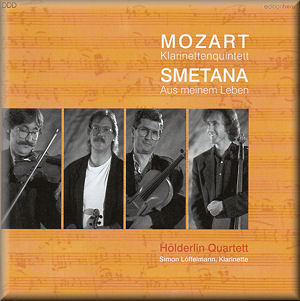 |
 |
|


|
Wolfgang Amadeus
MOZART (1756 - 1791)
Clarinet Quintet in A, K581 (1789) [32:39]
Bedrich SMETANA (1824 - 1884)
String Quartet No.1 in E minor, Aus meinem Leben (1876) [30:16]
 Simon Löffelmann (clarinet), Hölderlin Quartet (Ralph
Kulling, Thomas Haug (violins), Bojidar Dobrev (viola), Christoph
Bieber (cello))
Simon Löffelmann (clarinet), Hölderlin Quartet (Ralph
Kulling, Thomas Haug (violins), Bojidar Dobrev (viola), Christoph
Bieber (cello))
rec. 18 - 20 March 1990, Filderhalle, Leinfelden Echterdingen, Kammermusiksaal
DDD
 EDITION HERA 02122 [62:56] EDITION HERA 02122 [62:56] 
|
|
|
This is a strange coupling, one of Mozart’s sunniest inspirations
with Smetana’s nihilistic, autobiographical 1stQuartet.
Not only is the coupling unusual but so is the performance of
the Mozart Quintet. The members of the Hölderlin
Quartet obviously see this work as a romantic composition, and
they play it with full tone and long bows. It’s all rather
robust, and there’s little of a Mozartean feel to be found
in the performance. By this, I mean that you don’t have
to perform music of this period on instruments of the day, with
all the usual things which accompany “original”
performances, for you can play a Mozart Symphony with a larger
orchestra if the interpretation has style. And it’s that
style which I find lacking here. This approach would suit the
Brahms or Reger Clarinet Quintets so well, but, for me,
it’s all too big and romantic.
Smetana’s Quartet, on the other hand, is perfect
for the Hölderlin Quartet’s rich and romantic approach.
From the opening attack, and with the most subtle use of rubato,
the music is nervous and unsettled. There is a real tension
in the air and this isn’t going to be an easy listen.
The folk dance of the scherzo has a nice weight to it, and,
together with lots of rubato, it appears fresh and rustic. The
Largo sostenuto is, by turns, dramatic and winsome. I
was particularly impressed with the quiet, sustained playing
the Quartet achieved in the coda. The finale starts as all gaiety
until the fateful moment when the high pitch, which Smetana
constantly heard in his head, bursts in - a bold stroke here
for the Quartet stops and there is a long pause before the devastation
is wrought; Smetana’s, and our, lives are shattered by
this intrusion into our private thoughts and feelings. The ending
is restrained and emotional. Despite this, the performance ultimately
fails to engage and communicate with me.
With my hand on my heart I cannot recommend this recording because
of the odd coupling and the fact that the performances simply
don’t excite and satisfy. The Smetana is better served
by the Hollywood Quartet’s 1955 recording (Testament
SBT 1072, coupled with Kodaly’s 2nd
and Dvorak’s American Quartets in very good sound)
and the 1928 recording by the Bohemian Quartet (not available
at the moment) will take some beating. The Mozart Quintet
has over 100 recordings so there’s an interpretation for
everyone, my favourites being Gervase de Peyer, both with the
Amadeus Quartet on either Deutsche Grammophon (437646, coupled
with Karl Leister playing the Brahms Quintet) or BBC Legends
(BBCL 4061, a live performance from the Aldeburgh Festival in
1966).
Bob Briggs
|
|




 All Nimbus reviews
All Nimbus reviews








